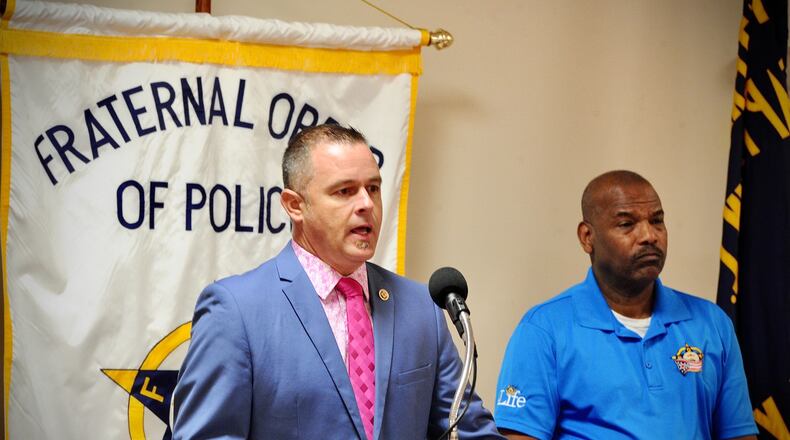Zach Williams, a member of the Dayton Fraternal Order of Police’s executive board, said on Monday evening he was only aware of one member of the police department being sent home for refusing to submit to testing.
Representatives of the police and fire unions met with Dayton HR director Ken Couch for about seven hours on Monday to discuss the city’s testing policy, and both sides said they felt it was a productive discussion though it didn’t lead to any policy changes.
“We’re disappointed that we don’t have a solution today, but we’re hopeful that we can get something done in the up and coming days,” Williams said.
The unions claim that the city’s vaccination/testing policy is unlawful and must be approved through collective bargaining. Last week, the police and fire unions said that a significant number of workers might be sent home for refusing to participate in the testing process.
Couch said testing began on Monday, but city employees have varying shifts and work schedules, and staff have until the end of the week to be vaccinated or tested or sent home on unpaid leave.
Couch said the city has not changed its position that the city’s policy does not need union approval because it is a workplace safety matter.
But he said the city may be willing to make some changes that the unions have requested, though he and Williams declined to go into specific details about what’s being considered.
“There are some changes that we might be able to consider,” Couch said. “But there are a couple of other ones we are something we’re not willing to consider.”
Couch said the city might revise the policy if the changes do not harm the safety of city employees and citizens. Williams said police want the workplace to be safe.
The Dayton Daily News asked city officials Monday morning how many employees were being tested, and how many were sent home.
Early in the day, Dickstein said the city did not have that information yet, adding that, “police and fire have attended to work as usual” and “much of the testing is rolling throughout the day.” Couch said likely he’d have testing data to share on Tuesday.
Ann Sulfridge, president of AFSCME Dayton Public Service Union Local 101, said on Monday that she had not received any reports of her members being sent home for refusing testing. That union represents hundreds of city employees, including blue collar and clerical staff.
Like the police, fire and building trades unions, DPSU Local 101 filed an unfair labor practice complaint with the State Employment Relations Board, claiming the city’s vaccination and testing policy is an unlawful change in work conditions that violates the union’s collective bargaining rights.
Those complaints have been assigned to an investigator, according to SERB Executive Director Christine Dietsch, and a report will eventually be presented to the SERB board.
Officials with the Dayton Fraternal Order of Police and the Dayton International Association of Firefighters said last week that a couple hundred police and fire personnel may not be vaccinated or have refused to share their vaccination status with the city. They said if some of those employees do not agree to testing and are sent home, the city could see manpower shortages and service delays and disruptions.
Craig Robinson, president of the Dayton International Association of Fire Fighters Local 136, last week said the city violated state law by imposing vaccination and testing requirements without negotiating with its unions.
He said the new policy is a significant change to work conditions, which must be bargained.
City officials last week said the testing requirement is intended to keep its workforce healthy and protect the public.
Employees who refuse to be tested will be sent home on unpaid leave and will not be allowed to return to work until they have a negative COVID-19 test, city officials said.
About 773 of the city’s 1,800 employees (43%) are not vaccinated or declined to disclose their vaccination status, according to data the city shared on Thursday.
About 464 of the employees who are unvaccinated or declined to disclose are in the police and fire departments.
About the Author


